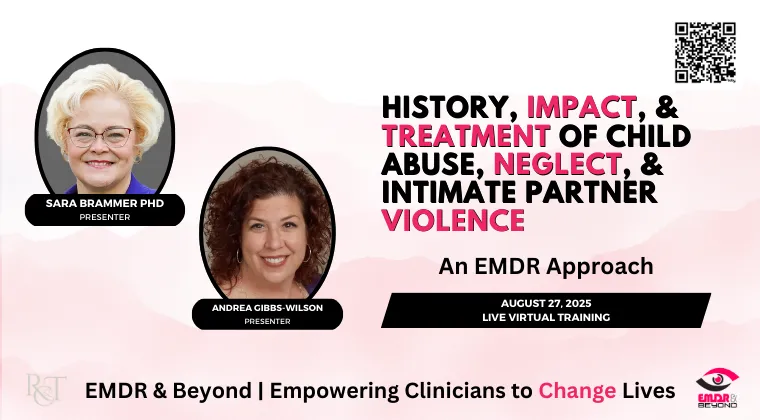The History, Impact, and Treatment of Child Abuse,
Neglect, and Intimate Partner Violence:
An EMDR Approach
With Sara Brammer PhD & Andrea Gibbs-Wilson MA, LPC

Overview
This 6 hour program provides a comprehensive exploration of the historical, psychological, and social dimensions of child abuse, neglect, and intimate partner violence, focusing on their profound impact on individuals and families.
Participants will review the historical context of these issues, including their intersection, and define key terms while analyzing the prevalence and dispelling common myths. A key component of the training is an in-depth discussion of the Adverse Childhood Experiences (ACEs) survey and its significant influence on brain development. Participants will identify two trauma therapy interventions specifically designed to support adult and child survivors of violence, with a particular focus on Eye Movement Desensitization and Reprocessing (EMDR) therapy. The core principles of EMDR—including the Adaptive Information Processing (AIP) model, will be explored to demonstrate how they facilitate trauma resolution specifically for this population.
This program addresses the varied ways in which different populations respond to trauma, emphasizing sociocultural and individual factors that influence these responses. EMDR’s eight-phase protocol will be highlighted with its application in addressing the psychological wounds of abuse and neglect.
Participants will gain practical strategies for implementing EMDR techniques, including resource development and installation (RDI) to build resilience, as well as specific modifications for working with complex trauma and dissociation.
Theoretical frameworks for trauma treatment will be evaluated, along with the stages of recovery for survivors, equipping participants with tools to support individuals on their healing journey. By adopting a trauma-informed lens, this program offers critical insights and hands-on strategies for professionals working with survivors of child abuse, neglect, and intimate partner violence, integrating EMDR as a transformative therapeutic approach.
This program is intended for Doctorate Level and Master Level Psychologists, LMFT, LMHC, LPC, LISW, LMSW and other Master Level Mental Health Practitioners who have successfully completed an EMDR Basic Training
Level: Intermediate & Advanced
Course Outline
Analyze the Historical Context
Evaluate the Impact of Trauma
Differentiate Trauma Therapy Interventions
Understand EMDR’s Theoretical Foundations
Apply EMDR’s Eight-Phase Protocol
Utilize Bilateral Stimulation and Resource Development
Adapt EMDR for Diverse Populations
Integrate Trauma-Informed Strategies
Cost
On Demand Version Coming Soon!
EMDRIA Credits: 6 (under review)
CEs: 6
EMDR & Beyond is the provider of (CEs).
EMDR & Beyond is approved by the American Psychological Association to sponsor continuing education for psychologists. EMDR & Beyond remains responsible for this program and its contents.
EMDRIA: EMDR & Beyond is an EC Provider #15007 and this program #15007-XX and is approved for EMDRIA Credits. Eligibility for EMDRIA Credits is restricted to those who have completed an EMDRIA-Approved Basic EMDR Training.
To receive CE or EMDRIA credits for in-person presentations or live virtual attendance, participants must attend the entire program in real time. Partial credit is not available, and watching a recording in place of attending live does not qualify for credit.
To receive CE or EMDRIA credits for the On-Demand version (typically available 20–30 days after the live event), participants must complete the full curriculum and pass a post-quiz with a score of at least 75%.
While the course evaluation is not required to receive CE credits, we highly value your feedback and encourage you to complete it. The system will automatically release your certificate after you have completed and passed the quiz.
Dr. Brammer has an extensive history as an educator and expert clinician in the treatment of Intimate partner violence, batter's education and abuse, and the use of EMDR Therapy. Read more about her!
Andrea Gibbs Wilson, M.A., LPC, is a dedicated mental health professional with over 25 years of experience specializing in trauma, domestic violence, and sexual abuse and is certified EMDR therapist. Read more about her!


